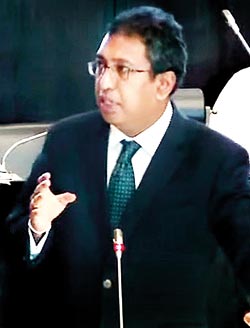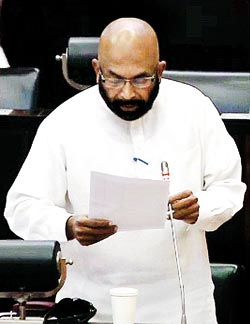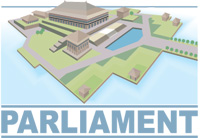Columns
Budget 2024: Revolutionary or a fairytale; depends on which side of the House one is in

SJB MP Dr. Harsha De Silva
President and Finance Minister Ranil Wickremesinghe presented his government’s Budget 2024 on Monday (13) under the theme “Prelude to a Bright Future.” MPs from the government praised his budget as “revolutionary” during the seven-day debate on the Second Reading that started on Tuesday. The opposition, however, dismissed it as a “fairytale” that would not have a happy ending.
The President’s budget speech was like being taken on a holiday to Disneyland. “But today, we have to look at Disneyland from the outside,” quipped SJB MP Eran Wickramaratne as he opened the debate on Tuesday. Mr. Wickramaratne said people were facing severe difficulties today, with those who ate three meals a day forced to make do with two, malnutrition increasing, and 7 million Sri Lankans now living below the poverty line.
Close to 600,000 families have had their electricity disconnected as they are unable to pay their electricity bills while the crisis in the state-run health sector continues. Meanwhile, the country faces a severe problem with brain drain, with many professionals opting to leave, the MP said.
Mr. Wickramaratne further alleged that 69 out of 77 proposals presented by the Finance Minister under Budget 2023 had not been implemented. Many of the proposals that the President spoke of during his budget speech were also made in 2023 but were not implemented. “We can say even today that this budget too will not achieve its stated aims.”
The budget that the government presented was revolutionary in nature, State Finance Minister Ranjith Siyambalapitiya told the House. It was revolutionary because it was highly progressive and proposed many changes.
The government had targeted revenue amounting to Rs. 3408 billion for 2023 but now expects that revenue total to be Rs. 2839 billion by the year’s end. As such, Mr. Siyambalapitiya acknowledged that the government would fall short by about 16% when it came to achieving its revenue target for 2023. He said the main reason for the shortfall is that the government was trying to raise revenue at a time of negative growth.

State Finance Minister Ranjith Siyambalapitiya
The state minister stressed that the government was exercising enormous fiscal discipline due to the prevailing crisis. “We held many rounds of discussions with various sectors when drafting these budget proposals. When the trade unions came for discussions, they wanted salary increases, while small and medium-scale entrepreneurs wanted a reduction in taxes. These are contradictory demands, and we had to draft this budget in the midst of all these difficult challenges.”
There’s nothing revolutionary about the budget, though it does contain many fairytales, said National People’s Power (NPP) MP Dr. Harini Amarasuriya. One of the main reasons that Sri Lanka had become a bankrupt country was that it had been systematically deprived of many of its precious resources, she alleged. The NPP MP questioned whether selling off national assets was the only viable solution.
While the government proposes to increase the Cost of Living Allowance for public servants by Rs. 10, 000, the increase in the Value Added Tax (VAT) and the Social Security Contribution Levy would render the increased allowance meaningless, she said. “The prices of food and essential items that will go up with the increase in these taxes will mean this increase in the allowance will not at all be sufficient. This government’s policy seems to be to levy taxes from the working class to meet its revenue targets.”
The government has set aside Rs. 133 billion to pay for the salary increases of public servants. However, it targets raising Rs. 800 billion from newly imposed taxes alone, said SJB MP Dr. Harsha De Silva. “In other words, if there is a salary increase of Rs. 100, taxes will go up by Rs. 600.”
Furthermore, there has been no increase in taxes for the wealthy, such as through the Capital Gains Tax. The taxes are all consumption taxes directed at ordinary people, he stressed. VAT will be increased from 15% to 18%, while VAT will also be imposed on some 100 goods that had never had it imposed before. “VAT will be imposed on phones, computers, all types of machinery, electrical goods, all types of medical equipment, tea leaves, and latex, among others. None of this was mentioned in the President’s Budget Speech or its annexures. It is being done through a gazette, which I think is unfair,” he added.
 The MP, who is also the Chairman of Parliament’s Committee on Public Finance (COPF), said the Committee unanimously decided to write to the President protesting the matter and stressing that it is the President’s responsibility as Finance Minister to be fully transparent with Parliament regarding all these measures. “There’s no point in him just coming here and saying he will increase salaries and other things. He must explain to the legislature and the people as to how he intends to find the money for them.”
The MP, who is also the Chairman of Parliament’s Committee on Public Finance (COPF), said the Committee unanimously decided to write to the President protesting the matter and stressing that it is the President’s responsibility as Finance Minister to be fully transparent with Parliament regarding all these measures. “There’s no point in him just coming here and saying he will increase salaries and other things. He must explain to the legislature and the people as to how he intends to find the money for them.”
The country was moving from stability to growth, Prime Minister Dinesh Gunawardena said, joining the debate. He noted that not a single public servant had lost their jobs despite the economic crisis, unlike in countries such as Greece, Spain, and Portugal during their economic crises, which left their governments unable to pay even half the salaries of public sector employees.
“It was traditionally expected that we would have had to send a vast number of the 1.3 strong force of public servants home because we would not be able to pay their salaries. But we were able to protect the entire government sector mechanism,” he insisted. The relief measures that have now been announced in the budget include relief for 1.3 million public sector employees and 700,000 pensioners, while funding for the Aswesuma welfare benefit scheme will be increased significantly from Rs. 60 billion to Rs. 183 billion, the Premier pointed out. “As such, we are increasing the allocations for relief threefold. The relief for these sectors will help ease the cost of living, which we accept has gone up during the last two years,” he further said.
The debate on the Second Reading of Budget 2024 will continue until next Tuesday (21) with a vote on the Second Reading due to take place later that evening.
| Ranatunga calls for cooperation, Sirisena paints bleak picture | |
| Joining the Budget debate yesterday (18), Chief Government Whip and Urban Development Minister Prasanna Ranatunga questioned why all parties could not heed President Wickremesinghe’s appeal to come together to revive the country’s economy. “If we can come together on the matter of the Cricket Board and pass unanimous resolutions regarding the Israel-Palestinian conflict, why can’t we take up the President’s request to work together?”The Budget contains many positive proposals and while it can’t exactly be a “Welfare Budget” given the current economic crisis, everyone should be glad that it has given at least this level of relief, the minister further said. Former President and Sri Lanka Freedom Party (SLFP) Chairman Maithripala Sirisena painted a bleak picture of the country’s present state. He said both the country’s free healthcare and education sector had been hit hard by the economic crisis which he said had occurred due to the shortsighted policies of the Gotabaya Rajapaksa government. Mr Sirisena said the term “free” has to be removed from both sectors now. “Today, children have to rely on tuition classes to pass exams, but most parents don’t have the money for those classes. Those who can, send their children overseas, but those children in rural areas such as Anuradhapura, Polonnaruwa and Hambantota suffer terribly due to these issues as their parents can’t afford to spend on education.” The same is true for healthcare, where those who are poor can no longer make use of free healthcare because it is no longer free, he added. |
Buying or selling electronics has never been easier with the help of Hitad.lk! We, at Hitad.lk, hear your needs and endeavour to provide you with the perfect listings of electronics; because we have listings for nearly anything! Search for your favourite electronic items for sale on Hitad.lk today!


Leave a Reply
Post Comment